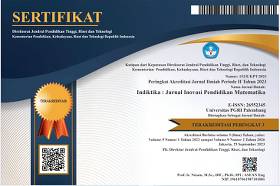Profil Pemahaman Konsep Fungsi Siswa SMP Ditinjau dari Gaya Kognitif Field Independent dan Field Dependent
DOI:
https://doi.org/10.31851/indiktika.v6i2.14649Keywords:
pemahaman konsep, fungsi, gaya kognitifAbstract
Penelitian ini bertujuan untuk mendeskripsikan pemahaman konsep fungsi siswa SMP berdasarkan gaya kognitif field independent dan field dependent. Data dikumpulkan melalui tes Group Embedded Figures Test (GEFT), tes kemampuan matematika, tes pemahaman konsep fungsi, serta wawancara semi-terstruktur. Teknik analisis data meliputi reduksi data, penyajian data, dan penarikan kesimpulan. Hasil penelitian menunjukkan bahwa siswa dengan gaya kognitif field independent lebih mampu menginterpretasikan masalah, menyajikan informasi dalam berbagai bentuk fungsi, dan membuat contoh fungsi secara logis dibandingkan siswa dengan gaya kognitif field dependent. Pada indikator classifying, kedua kelompok mampu mengelompokkan relasi menjadi fungsi atau bukan fungsi dengan alasan logis. Kesimpulannya, gaya kognitif berpengaruh pada pemahaman konsep fungsi. Guru diharapkan dapat mengembangkan strategi pembelajaran yang sesuai dengan gaya kognitif siswa, sedangkan peneliti selanjutnya dapat memperluas kajian ke materi matematika lainnya yang dianggap sulit.
References
Dewi, K., & Hakim, D. L. (2021). Analisis Kemampuan Pemahaman Matematis Siswa SMA pada Materi Integral. Jurnal Karya Pendidikan Matematika, 8(2), 66–76.
Endrawati, P., & Aini, I. N. (2022). Deskripsi Kemampuan Berpikir Kritis Matematis Dalam Pembelajaran Relasi dan Fungsi. Jurnal Penelitian Dan Pembelajaran Matematika, 15(1), 118–137.
Fardani, Z., Surya, E., & Mulyono, M. (2021). Analisis Kepercayaan Diri (Self-confidence) Siswa dalam Pembelajaran Matematika Melalui Model Problem Based Learning. Paradikma, 14(1), 39–51.
Hazimah, G. F., & Sutisna, M. R. (2023). Analisis Faktor yang Mempengaruhi Rendahnya Tingkat Pemahaman Numerasi Siswa Kelas 5 SDN 192 Ciburuy. EL-Muhbib Jurnal Pemikiran Dan Penelitian Pendidikan Dasar, 7(1), 10–19.
Hrp, N. A., Masruro, Z., Saragih, S. Z., Hasibuan, R., Simamora, S. S., & Toni, T. (2022). Buku Ajar Belajar dan Pembelajaran.
Kepner, M. D., & Neimark, E. D. (1984). Test–retest Reliability and Differential Patterns of Score Change on the Group Embedded Figures Test. Journal of Personality and Social Psychology, 46(6), 1405.
Maulidia, F., Saminan, S., & Abidin, Z. (2020). The Implementation of Problem-Based Learning (PBL) Model to Improve Creativity and Self-efficacy of Field Dependent and Field Independent Students. Malikussaleh Journal of Mathematics Learning (MJML), 3(1), 13–17.
Mayer, R. E. (2002). Rote Versus Meaningful Learning. Theory into Practice, 41(4), 226–232.
Moore, M. (2020). On a Theory of Independent Study. In Distance Education (pp. 68–94). Routledge.
Moreno-Guerrero, A.-J., Aznar-Díaz, I., Cáceres-Reche, P., & Alonso-García, S. (2020). E-learning in the Teaching of Mathematics: An educational experience in adult high school. Mathematics, 8(5), 840.
Presmeg, N. (2006). Research on Visualization in Learning and Teaching Mathematics: Emergence from psychology. In Handbook of research on the psychology of mathematics education (pp. 205–235). Brill.
Skemp, R. R. (2012). The Psychology of Learning Mathematics: Expanded American edition. Routledge.
Susanto, H. (2022). Kemampuan Pemahaman Matematis Siswa melalui Model Problem Based Learning (PBL) Berbantuan Geogebra. JOEL: Journal of Educational and Language Research, 2(3), 451–462.
Waruwu, M. (2023). Pendekatan Penelitian Pendidikan : Metode Penelitian Kualitatif , Metode Penelitian Kuantitatif dan Metode Penelitian Kombinasi ( Mixed Method ). Jurnal Pendidikan Tambusai, 7(1), 2896–2910.
Yasmansyah, Y. (2022). Konsep Merdeka Belajar Kurikulum Merdeka. Jurnal Penelitian Ilmu Pendidikan Indonesia, 1(1), 29–34.
Downloads
Published
Issue
Section
License
Copyright (c) 2024 Wahyu Wijayaningrum, Ketut Budayasa, Raden Sulaiman

This work is licensed under a Creative Commons Attribution-ShareAlike 4.0 International License.
This work is licensed under a Creative Commons Attribution-ShareAlike 4.0 International License.
Authors who publish with this journal agree to the following terms:
- Authors retain copyright and grant the journal right of first publication with the work simultaneously licensed under a Creative Commons Attribution License that allows others to share the work with an acknowledgement of the work's authorship and initial publication in this journal.
- Authors are able to enter into separate, additional contractual arrangements for the non-exclusive distribution of the journal's published version of the work (e.g., post it to an institutional repository or publish it in a book), with an acknowledgement of its initial publication in this journal.
- Authors are permitted and encouraged to post their work online (e.g., in institutional repositories or on their website) prior to and during the submission process, as it can lead to productive exchanges, as well as earlier and greater citation of published work.












